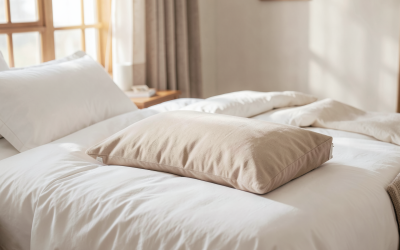Sleeping on your stomach can be an uncomfortable and sometimes claustrophobic experience, but understanding the feeling and making some lifestyle changes can help prevent it. We’ll examine the reasons to avoid sleeping on your stomach, the tips and adjustments to reduce claustrophobia while lying down, and some alternatives to consider.
Reasons to Avoid Sleeping on Your Stomach
One of the main reasons to avoid sleeping on your stomach is that you may experience more difficulty breathing. During sleep, the intestines move into your chest and compress the lungs, making it difficult to take in oxygen. Not to mention that your neck and head can be in an uncomfortable position when lying on your stomach due to gravity.
Lying on your stomach can also cause a sensation of feeling trapped or cramped, leading to feelings of claustrophobia. When the body is unable to move in certain directions, it can cause feelings of tightness and restlessness that can be disturbing and disrupt sleep.
Understanding the Feeling of Claustrophobia
Claustrophobia is a highly individualized experience and its source can vary from person to person. It can arise from trauma, anxiety, or simply from being in a space that makes you feel closed off or vulnerable. Although it might seem difficult to understand or relate to at first, it is actually a common experience.
For those who have difficulty sleeping on their stomach due to claustrophobia, it’s important to recognize the underlying fear before attempting to make any lifestyle changes. Taking the time to recognize and understand the source of the fear can help you better understand and manage feelings of claustrophobia.
Tips for Reducing Claustrophobia While Sleeping on Your Stomach
For those that still want to sleep on their stomach but feel trapped when they do so, there are a few tips that can help reduce these feelings. Try controlling the environment of your sleeping space, such as keeping windows open or having a fan to generate air flow. This can help create an openness that will make it easier to move around and feel less restricted.
Another tip is to make sure that your bedding is soft enough to allow for more freedom of movement. Rather than using a mattress or pillow with too much give, try out several types until you find the perfect balance.
Adjusting Your Sleeping Position to Reduce Claustrophobia
If sleep still continues to be difficult on your stomach, there are a few adjustments you can make that may help reduce feelings of claustrophobia. For example, trying different positions such as sideways or with your legs bent can help relieve pressure from lying on your stomach. This could create a more open feeling which will be more conducive for calming down and settling in for the night.
You can also try using an adjustment pillow for additional support and comfort. Having something to prop you up against, such as a wedge pillow or body pillow, can help prevent the sensation of feeling trapped.
How To Create A More Open Sleep Environment
Creating an environment conducive for sleeping on your stomach may take some effort but it is possible. Firstly, consider what type of sleepwear you’re wearing. If it’s too restrictive and tight, you may feel more closed off while sleeping. Try switching to looser clothing in order to have more freedom of movement.
Another way to alleviate claustrophobia while sleeping on your stomach is by keeping the temperature and humidity of your room comfortable. Having a window open for air circulation or using a fan can also be beneficial. Creating an environment that feels open and airy can be conducive for calming down and settling in for the night.
Benefits of Sleeping on Your Stomach
It’s important to remember that not all sleep positions are created equal and that there are benefits of sleeping on your stomach depending on each individual’s needs. Lying on your stomach can reduce facial swelling due to the pressure release and decrease lower back pain because the front of your body is not as compressed as with other sleep positions.
It’s also great for those who prefer minimal light when sleeping as it gets rid of any shining reflections off lights against your face. Additionally, it can be beneficial in promoting digestion, circulation, and nerve reflexes when done correctly.
Alternatives to Sleeping on Your Stomach
If you cannot seem to find any comfort while sleeping on your stomach, there are plenty of alternatives to choose from. Generally speaking, most people prefer either sleeping on their back or side as both positions calm down the body by preventing compression of organs.
If you’re looking for more comfort, try using either raised pillows or wedge pillows which will provide support without having the body overly compressed in any particular direction. Additionally, supplementing with additional comfort items, like weighted blankets or memory foam earplugs, can help make for a more restful sleep.
Discussing Claustrophobia with a Professional
Although most people may be able to manage their own claustrophobia with lifestyle adjustments or alternative sleep positions, consulting a professional can help determine if there are underlying issues causing the fear. A sleep therapist or psychologist can help diagnose the source of the fear and provide strategies and tools to cope with it.
In some cases, counseling may also be necessary. Speaking with a trained clinical expert can help uncover emotional issues that may need addressing in order to help reduce feelings of claustrophobia.
Overall, learning more about sleeping on your stomach and understanding the feeling of claustrophobia can help ensure a more restful sleep. By making the necessary lifestyle changes or seeking professional help if needed, you’ll be able to find an open and comfortable sleep state that works for you.



